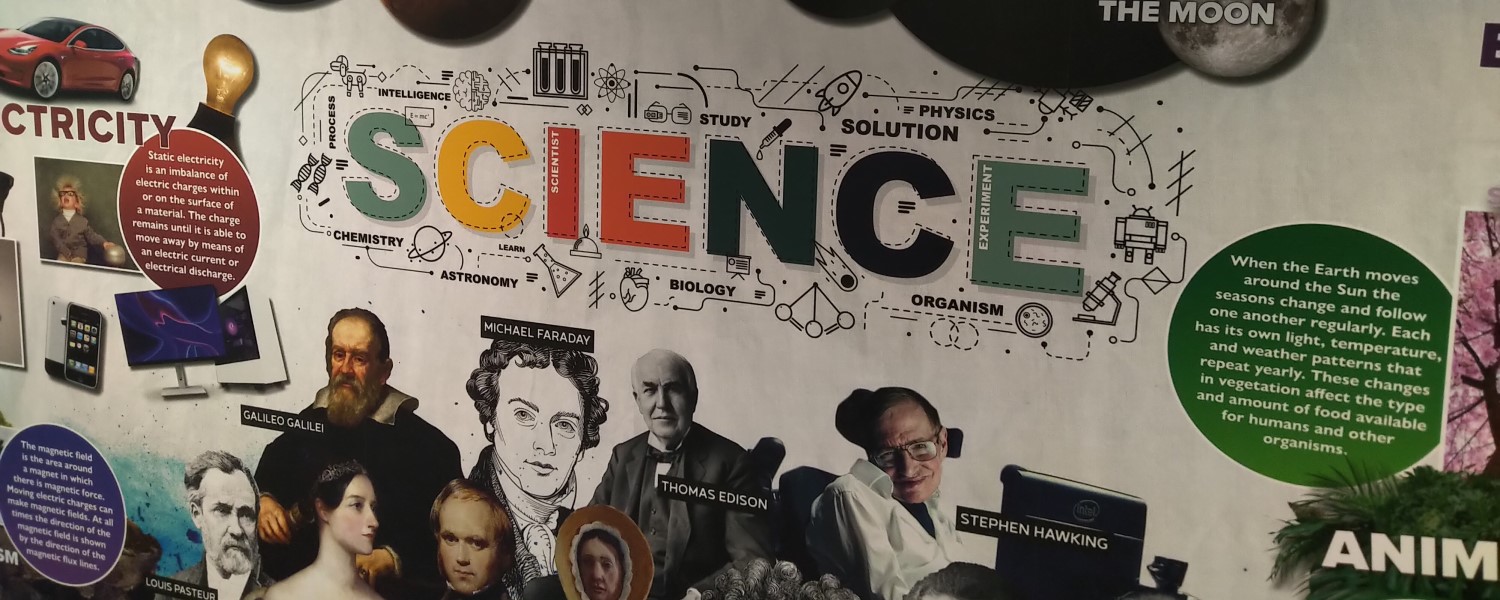The study of science is focused on developing an understanding of natural phenomena and the man-made world including the ways in which science impacts on people’s lives and the environment. Our curriculum covers all areas of science learning, including living things, plants, humans and animals, materials; properties, changes and matter, Earth and space, forces, energy, electricity and electromagnetism and waves. Pupils are taught essential aspects of the knowledge, methods, processes and uses of science.

Learning in science is practical and hands-on and allows learners to collect first-hand evidence from observation and/or experimentation within the different areas/branches of scientific study.
In Science, learners will have the opportunity to
- experience situations in which problems are posed, having the opportunity to develop their own solutions;
- develop a working understanding of safety and care;
- formulate testable hypotheses;
- develop skills of using equipment and measurement, making decisions about when, what and how to measure;
- organise and record data and draw conclusions from results;
- develop written and oral reporting skills, alongside a scientific vocabulary to use in communicating findings and ideas.
As a result of our science curriculum, learners will become equipped with the scientific knowledge required to understand the uses and implications of science, today and for the future. They will understand the limitations of their own experiments and develop an understanding of science being dynamic and that ideas and theories are constantly evolving even if they cannot yet be tested. International learning in science includes learning about science in different times and places and how current scientific thinking and exploration are influenced by culture, religion and attitudes to guardianship of the future.
Our aspiration is that children are inspired to be curious about natural phenomena and develop key knowledge and concepts in order to understand how science can be used to explain what is occurring, predict how things will behave, and analyse causes, both in and out of school.
To be successful, learners must:
-
develop scientific knowledge and conceptual understanding through the specific disciplines of biology, chemistry and physics
-
develop understanding of the nature, processes and methods of science through different types of science enquiries that help them to answer scientific questions about the world around them
-
use of a range of materials and develop scientific skills and key techniques as part of the practical process of investigation
-
evaluate materials, processes and scientific data
-
develop the appropriate vocabulary and subject-specific terminology to describe
-
understand the effects of science on people’s lives and its impact on the wider world
-
connect learning within different aspects of science and between science and other subjects (e.g. design technology, ICT)
-
Engage with ethical issues associated with scientific activities and experimentation by themselves and others.
Implementation
EYFS Understanding The World
Understanding the world involves guiding children to make sense of their physical world and their community. The frequency and range of children’s personal experiences increases their knowledge and sense of the world around them – from visiting parks, libraries and museums to meeting important members of society such as police officers, nurses and firefighters. In addition, listening to a broad selection of stories, non-fiction, rhymes and poems will foster their understanding of our culturally, socially, technologically and ecologically diverse world. As well as building important knowledge, this extends their familiarity with words that support understanding across domains. Enriching and widening children’s vocabulary will support later reading comprehension.
Toddlers and young children will be learning to:
-
Repeat actions that have an effect.
-
Explore materials with different properties.
-
Explore natural materials, indoors and outside.
-
Explore and respond to different natural phenomena in their setting and on trips
3 and 4-year-olds will be learning to:
-
Use all their senses in hands-on exploration of natural materials.
-
Explore collections of materials with similar and/or different properties.
-
Talk about what they see, using a wide vocabulary.
-
Plant seeds and care for growing plants.
-
Understand the key features of the life cycle of a plant and an animal.
-
Begin to understand the need to respect and care for the natural environment and all living things.
-
Explore and talk about different forces they can feel.
-
Talk about the differences between materials and changes they notice
Children in reception will be learning to:
-
Explore the natural world around them
-
Describe what they see, hear and feel whilst outside.
-
Understand the effect of changing seasons on the natural world around them.